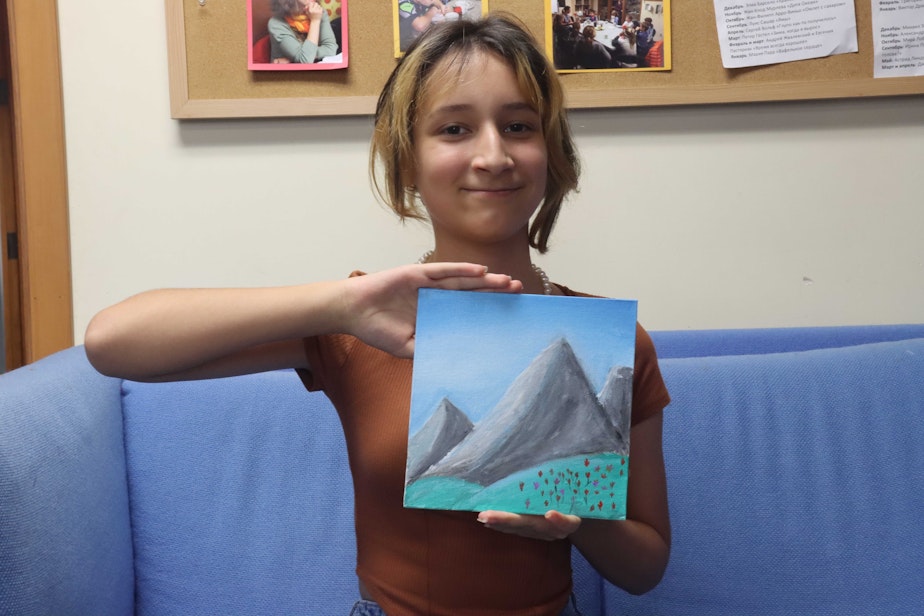Starting school can be hard, especially as a Ukrainian refugee who doesn't speak English

Many newly arrived Ukrainian refugee children are starting school in Washington state this fall. Some of these children are not yet fluent in English.
Sabrina is 12 years old. She is an artist who loves painting landscapes.
She is among more than 200 Ukrainians who fled their home country after the Russian invasion and have settled in Washington.
Sabrina and her family arrived in King County a few weeks before the last school year ended.
Like some refugees from this war, Sabrina's first language is Russian. She speaks very little English.
Sabrina had her first day at a Seattle area middle school right before summer break.
"On the first day, I didn't talk much to others," Sabrina said. "Rather, they tried to talk to me, via Google Translator, and using gestures. ”
KUOW is not using Sabrina's last name to protect her relatives who are still in Ukraine.
Sponsored
Vanja Pejic, a psychologist at Boston Children's Hospital’s Trauma Community Resiliency Center, says newly arrived refugees often face challenges beyond just bridging a language gap. Those challenges can include things like "finding a new home and community, and culture attending to a new school, experiencing isolation, or discrimination from peers or the community."
For Sabina, this isn’t the first time she has fled her home, joined a new community, and learned a whole new language.
Sabrina grew up in Crimea. When she was 4 years old, Russia annexed the region. Her family fled. Her parents decided it wasn’t safe to stay in their home.
"When my parents were packing, and moving out of the Crimea, I was told that we were going on vacation," Sabrina said.
They fled to Lviv, a large city in Ukraine's west. Her parents wanted to move as far away from the Russian border as possible. In Lviv, where Sabrina started daycare, most people spoke Ukrainian.
Sponsored
"At first they thought I was Russian because I spoke Russian. I did not know Ukrainian," Sabrina explained. "Of course, as a child, I was offended. I didn't want them to think I was a Russian. Papa said I was not Russian."
In less than a year, Sabrina became fluent in Ukrainian and made lots of friends.
Even after adjusting to their new home, Sabrina and her family hoped to return to Crimea.
"[My] parents said, that we would go back when the war ends and Ukraine wins," Sabrina said.
But, they didn't get to return to Crimea. One morning, seven months ago, Sabrina got ready for school and went to say goodbye to her mother. Her mother told her a war started. Russia had launched a full-scale invasion into Ukraine. Sabrina said it was a brief conversation, then she left for her last day of school in Ukraine.
Once she got to school, her classmates and teachers were talking about the war. But Sabrina sat quietly in the classroom and tried to process the information. "They were saying a war began,” she said. “I thought they were just joking. I didn't understand anything."
Sabrina’s family packed their bags and fled the country that night.
Sponsored
"Just like the first time, I was just told that we were leaving," Sabrina said. "I already knew about the war, so there was no point in lying to me."
They bounced around different places before finally settling in King County in late May. She recalled the first time seeing the U.S.
"It was very unusual. Lots of greenery. All the roads were smooth,” she said. “The road signs were all in English."
Over the summer, Sabrina had some time to practice her English.
She also had some fun.
She attended a summer camp for Ukrainian refugee children at Lucky Pen, a school in Redmond. She took an acrylic painting class and painted a scene with three snowy mountains.
Dr. Rajeev Bais, who runs a refugee clinic in South Carolina, says refugee children learning new languages succeed when they have room to be a kid.
Sponsored
"That's where good friends come in, good community members come in, and good programs come in and they are free to play," Bais said.
Sabrina says she wants to go home to Crimea one day.
"Right now there are lots of Russians in the Crimea," Sabrina explained. She says she wants to wait and stay in the United States for a few years, "So they [Russians] would leave, so that everything would get restored, more or less.”
Sabrina started seventh grade this month and is enjoying her art classes.
She’s still using Google Translate to communicate. But, her English is improving.
It’s enough to make new friends in her new home away from home.
NOTE: An earlier version of this article incorrectly identified Lviv as Ukraine's capital and largest city.
Language assistance was provided by Dan Kreymer and Katerina Warns.
Melissa Takai voiced Sabrina in English.




